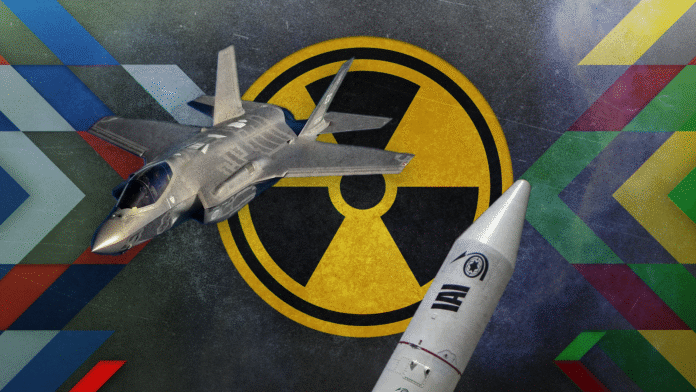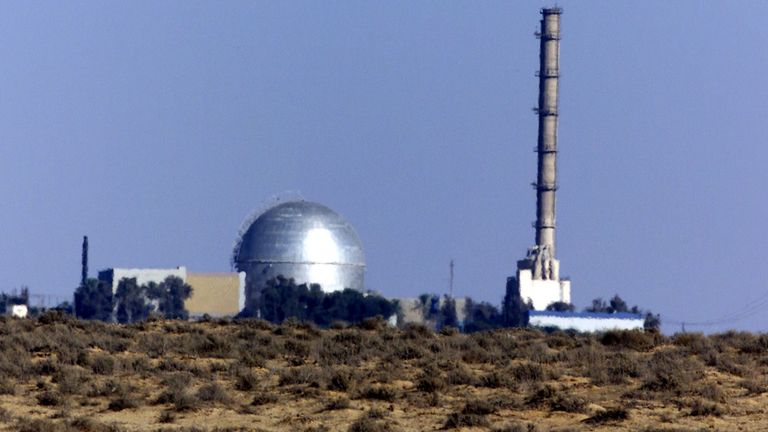Shrouded in secrecy. Never confirmed or denied by the government. This is Israel’s alleged nuclear weapons programme.
Israeli Prime Minister Benjamin Netanyahu has long warned that Iran’s nuclear research is secretly looking to develop a nuclear bomb – something Iran has repeatedly denied.
But for decades there have been suspicions that Israel, not Iran, is the first Middle East country to obtain a nuclear weapon.
“It’s very opaque, there’s very little detailed information about it,” says Professor Nick Ritchie, an expert on international security and nuclear proliferation at the University of York.
But he adds: “There’s no debating whether Israel has nuclear weapons and a nuclear weapons programme. Everybody knows it does.”
When did Israel supposedly get nuclear weapons?
It’s believed Israel began building a stockpile of nuclear weapons in the early 1960s, according to a research document for the UK parliament.
“Israel developed nuclear weapons because of fear of encirclement and attack by the Arab states, potentially supported by the Soviet Union, that opposed its existence,” Prof Ritchie tells Sky News.
“There was a sense of acute threat to the existence of the Jewish state after the Holocaust. Back then it was not the regional power that it is now.”
In a declassified memo to President Richard Nixon in 1969, US Secretary of State Henry Kissinger discussed the recent purchase by Israel of American Phantom fighter aircraft – which were capable of carrying nuclear weapons.
He told the president that Israel had committed “not to be the first to introduce nuclear weapons” to the Middle East.
Kissinger added: “But it was plain from the discussion that they interpreted that to mean they could possess nuclear weapons as long as they did not test, deploy, or make them public.”
Whistleblower describes working at Israeli nuclear reactor
In the late 1980s, an Israeli former nuclear technician revealed information about his work at Israel’s Dimona reactor to a British newspaper, which led foreign experts to conclude that Israel had produced enough material for up to 200 nuclear warheads.
Mordechai Vanunu was later kidnapped by Mossad and brought back to Israel, where he was sentenced to 18 years in prison, the UK parliament document said.
When asked on CNN in 2011 whether his country has nuclear weapons, Mr Netanyahu responded: “Well, we have a longstanding policy that we won’t be the first to introduce nuclear weapons into the Middle East, and that hasn’t changed.”
Prof Ritchie says: “Senior Israeli officials, including prime ministers such as Ehud Barak, have acknowledged that Israel has a nuclear weapons programme, more often when they have retired.”
While it has repeatedly criticised Iran for what it claims is a pursuit of nuclear weapons, Israel itself is not signed up to the Nuclear Non-Proliferation Treaty, which commits countries that don’t have nuclear arms not to build or obtain them.
Read more:
What we know about Iran’s secretive ‘nuclear mountain’
Even after US strikes, Iran may still be able to make a nuclear bomb
What nuclear weapons might Israel have?
Given Israel’s policy of ambiguity in relation to its alleged nuclear weapons programme, it’s hard to precisely estimate how many nuclear warheads it may possess – and what type.
The Stockholm International Peace Research Institute (SIPRI), an independent organisation that provides analysis about conflict, says Israel likely has 90 warheads and they are made from plutonium.
Prof Ritchie says it is difficult to be certain but it is believed Israel has fission-based nuclear weapons – like the kind dropped on Hiroshima and Nagasaki by the US.
Whether they have thermonuclear fusion weapons – more powerful bombs like those in the arsenals of the US, Russia and the UK – is “difficult to say with certainty”.
“But of course Israel is a very geographically small state,” Prof Ritchie says, adding that in the event of an existential attack on the country, any use of its nuclear weapons against the armed forces of attackers in the region could result in Israel facing “extensive fallout” from the blasts.
How would Israel launch any potential nuclear attack?
There is the question of how Israel would deliver any nuclear strike.
The UK parliament document says: “Based on unconfirmed reports, Israel could be in possession of the nuclear triad, making it capable of delivering a nuclear capability via land, air and/or sea.”
The IDF operates several planes that could be capable of launching nuclear weapons, including the American-made F-16 and F-35 fighter jets.
Around 30 of Israel’s nuclear warheads are estimated to be gravity bombs (unguided munitions dropped from aircraft) for delivery by fighter jets, SIPRI has said.
It also reportedly has the ground-launched Jericho ballistic missile family, reportedly with ranges that could exceed 5,500km (3,400 miles), according to the UK parliament document.
It’s thought that up to 50 nuclear warheads are assigned for land-based missile delivery, SIPRI said.
The Israeli government has never confirmed that it possesses Jericho missiles.
Finally, Israel operates five Dolphin-class submarines which may also be capable of carrying nuclear warheads.
“Given that Israel does not officially acknowledge its apparent possession of nuclear weapons, the circumstances under which it would use them are highly unclear,” SIPRI said.
Debate over nuclear weapons
👉Listen to The World with Richard Engel and Yalda Hakim on your podcast app👈
Discussion of Israel’s alleged nuclear weapons programme raises questions about which countries – if any – should possess them and how this is enforced.
“The argument that nuclear weapons are acceptable for Israel but not for other states in the region is widely viewed as Western hypocrisy that is difficult for a number of countries to accept,” says Prof Ritchie.
“If it’s not acceptable for Iran to have nuclear weapons, why is it acceptable for Israel to have them? This is why many countries in the region, like Egypt, have pushed for the negotiation of a treaty to ban all weapons of mass destruction in the region, covering chemical, biological and nuclear weapons.”
Sky News has approached the Israeli government for comment.













